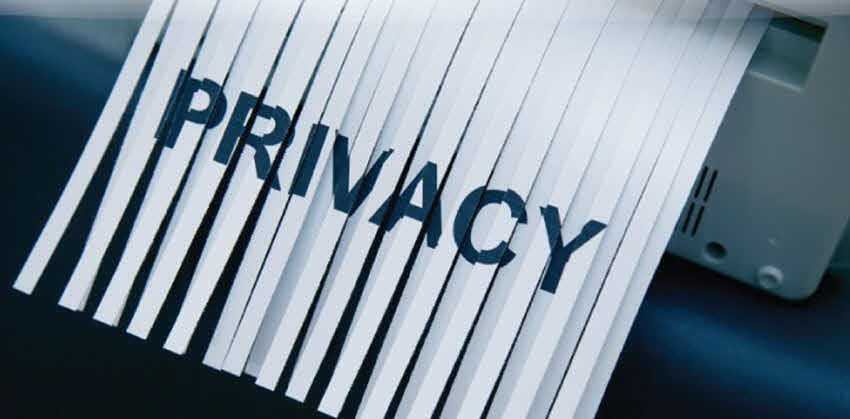Σκέφτεστε ότι "αφού δεν έχω τίποτα να κρύψω, γιατί να με νοιάζει για το απόρρητο ;". Πόσο σωστή είναι αυτή η άποψη; Έχει λογική και αν όχι που χωλαίνει;

Κρύβετε κάτι; Μήπως εμπιστευτικές συναλλαγές; Απόρρητες αποδείξεις της εξωγήινης ζωής; Την μυστική σας ταυτότητα ως αναρχικός hacker που θέλει να σύρει το χάος; Όχι; Οπότε εντάξει. Δεν υπάρχει λόγος να ανησυχείτε για το απόρρητο της ζωής σας αν δεν είστε εγκληματίας. "Αν δεν έχετε τίποτα να κρύψετε, δεν έχετε τίποτα να φοβηθείτε", σωστά;
Well, since most users commit legal offenses without wanting to, you are probably a criminal. Even if you are not, you will definitely have something to hide and you should have the right to do so if you wish. How do you think there was a security camera on the screen in a clothing store? What if someone posted all your financial information on Facebook? How would you feel if someone released a list of every email account you ever had?

Chances are you are not excited about all these things. But even if you are not particularly bothered, think about how governments and companies can use this data against individuals or groups they do not like. The more you know about someone, the better you can handle and control them and this generally does not tend to be in anyone's interest.
Το επιχείρημα "Αν δεν έχετε τίποτα να κρύψετε, δεν έχετε τίποτα να φοβηθείτε" καταρρέει όταν το εξετάσετε βαθύτερα, κυρίως επειδή "Ναι, έχετε πάντα κάτι να κρύψετε". Η δυνατότητα να κρύβετε πράγματα είναι καίρια, ανεξάρτητα από το πόσο σημαντικά είναι αυτά.
Edward Snowden outlined the basic need for privacy and privacy in a report on Reddit: "Το επιχείρημα ότι δεν σας ενδιαφέρει το δικαίωμα στην ιδιωτική ζωή επειδή δεν έχετε τίποτα να κρύψετε, δεν διαφέρει από το να λέτε ότι δεν σας νοιάζει για την freedom of speech επειδή δεν έχετε τίποτα να πείτε".

Everyone has things to hide, and that's normal
It is not just criminals who want to keep certain information secret. Most people, for example, obviously would not be indifferent to unlocking their phone and having government or corporate agents search for it. The reaction would be the same if they showed up at your house and started looking. They may not be able to arrest you because they will not even find a misdemeanor, but how okay would you be if what they find ends up in a database or used to identify your advertising profile?
Your personal data does not necessarily have to incriminate you to be classified as harmful. Depending on who gets your hands on your messages, your photos or the details of your moves, it could put you in an extremely difficult position. You may have some ethical habits that, if exposed, could damage some of your relationships with those around you or even lead to legal consequences. Since your identity, gender, political opinions, sexual orientation, health, your eating habits and dozens of other characteristics of your life can be collected and used by others, this dossier is characterized at best as an intrusion into your life and at worst as dangerous.

Everyone hides some small things, but collectively as a society we have decided that hiding these things is normal. Some people may hide more than others, but the only way to ensure the privacy and privacy of all people and possibly their security is to ensure that everyone has the same initial level of protection.
Lack of privacy causes real problems
Information is power. At the individual level, someone who possesses information about you can commit phishing attacks, steal your identity, leak information, and generally confuse you.

Most of you want your credit card details and ID number to be encrypted every time you enter them on a website, as this information can help someone harm you. However, your other personal information, from your birthday to your browsing history, can also be used against you, so you should draw a red line about what you allow to be collected and stored.
At a wider social level, services that collect huge amounts of data can cause real damage. Scandals such as Cambridge Analytica show how third parties may misuse your personal information to change policy outcomes and that the consequences of data breaches by companies could have an impact on your finances and future.
Ad targeting may be one of the most beneficial uses of all this data. Showing ads focused on your preferences, even if it is a bit manipulative, is not the problem. The problem is the edges of the information used to create them and the possibility that all the data can be used in potentially harmful ways.
It is a fundamental right. Societies need privacy to function
In general, people should be able to choose what they will reveal about themselves and their lives. This is something that most pro-democracy peoples and nations tend to agree on, such as the right to freedom of speech and the right to assembly. You do not have to accept any kind of moral or philosophical argument to see how closely connected privacy and freedom are.
Can you imagine a society where everything you do is monitored by some central entity? There's a reason that lack of privacy is a staple feature in the darkest visions of humanity's future. Intrusive surveillance is both the symptom and the cause of an unfree society. You can get a small taste of such a society if you consider that most governments, law enforcement agencies, and private companies will still choose today to monitor what people do. And this happens everywhere, from totalitarian regimes to fairly functioning democracies.

Η προφανής απειλή για την ελευθερία, είναι η ενεργός χρήση των δεδομένων για την καταστολή της διαφωνίας, με την παρακολούθηση και την παρεμπόδιση ακτιβιστών, δημοσιογράφων, ομάδων πολιτικής αντιπολίτευσης και άλλων "προβληματικών" κατηγοριών ανθρώπων. Το λιγότερο προφανές απειλή για την ελευθερία είναι η έλλειψη γνώσης και η αυτο-λογοκρισία. Αν δεν ξέρετε πού βρίσκεται η κόκκινη γραμμή και η ποινή για τη διέλευση της είναι μεγάλη, τότε θα μείνετε μακριά από αυτή.
It's a real phenomenon that does not just happen in places like North Korea and China. For example, Jon Penney of Harvard Law School, discovered μια αξιοσημείωτη πτώση στις αναζητήσεις της Wikipedia στις ΗΠΑ για όρους που θα μπορούσαν να επισημανθούν ως "σχετικά τρομοκρατικές" μετά τις αποκαλύψεις του Snowden. Εάν σκέφτεστε κάτι δύο φορές πριν προχωρήσετε να το κάνετε, τότε η προσδοκία σας για προστασία της ιδιωτικής ζωής είναι σίγουρα αρκετά χαμηλή, αφού αυτο-λογοκρίνεστε. Τουλάχιστον μέχρι να ενεργοποιήσετε ένα VPN και να πάτε στο DuckDuckGo. Οι άνθρωποι αλλάζουν τη συμπεριφορά τους όταν παρακολουθούνται.
Do you have anything to hide? yes you have
Everyone has something to hide and if they are deprived of this possibility to have something secret then it will have many negative consequences. Privacy is an abstract good and that is why we often underestimate it. It is like climate change, it is something that worries us, but not something that will make us get up from our couch.

On the other hand, becoming insane with privacy and watching your every move is a logical reaction, but you will probably make your life less comfortable and may not maintain your privacy as much as you would like. But without taking enough drastic action, it is difficult to have a truly private life. Knowledge and voice are the best way to promote the systemic changes needed to solve the problem.
Use and support privacy-conscious software (PrivacyTools.io keeps a good list), use a VPN if it doesn't slow you down too much, and if you hear someone say they're not worried because they have nothing to hide, just ask them to tell you hand over his unlocked phone and email passwords while you browse his photos and program history browsing.





